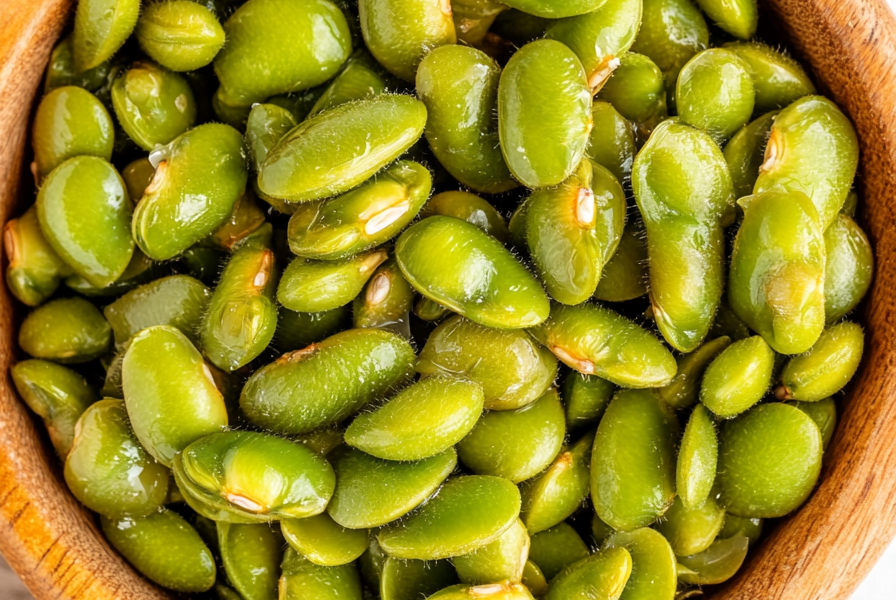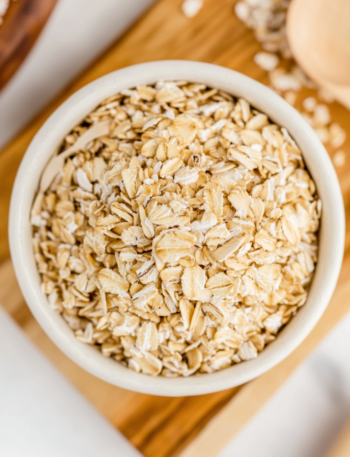Introduction to Edamame
Edamame, a delectable and nutritious food, refers to the young soybeans harvested before they reach maturity. Originating from East Asia, particularly Japan, China, and Korea, edamame has gained immense popularity worldwide as a healthy snack and ingredient in various culinary dishes. Traditionally, these vibrant green beans are served steamed or boiled in their pods, often sprinkled with a touch of sea salt. Over the years, edamame has transitioned from a niche item in Asian cuisine to a common offering in supermarkets and restaurants across the globe.
The growing interest in plant-based diets has contributed significantly to edamame’s rise in popularity, as people seek nutrient-rich alternatives to traditional protein sources. Rich in protein, fiber, vitamins, and minerals, edamame provides a well-rounded nutritional profile that appeals to health-conscious individuals. Notably, a single cup of edamame contains approximately 17 grams of protein, making it an excellent choice for vegetarians and vegans. Additionally, it is low in calories and fat, which aligns with dietary trends favoring sustainable and wholesome foods.
Beyond its health benefits, edamame’s versatility in cooking makes it a favorite among chefs and home cooks alike. It can be used in salads, stir-fries, and soups or simply enjoyed as a snack on its own. Furthermore, its mild yet slightly nutty flavor allows it to complement a variety of dishes seamlessly. As edamame continues to trend in global cuisine, it remains a testament to the fusion of health, flavor, and culinary creativity. Pantheon of ancient health practices continues to embrace this humble legume, ensuring its place as a staple in kitchens around the world.
Nutritional Profile of Edamame
Edamame, the young, green soybeans harvested before they reach maturity, are increasingly recognized for their notable nutritional profile. These legumes are not only a delicious snack but also a powerhouse of nutrients that can contribute significantly to a balanced diet. One of the most impressive aspects of edamame is its protein content. Unlike many plant-based food sources, edamame offers a complete protein, meaning it contains all nine essential amino acids required for human health. A serving of edamame typically contains around 17 grams of protein, making it an excellent choice for vegetarians and vegans seeking to bolster their protein intake.
In addition to protein, edamame is rich in dietary fiber. A serving provides upwards of 8 grams of fiber, which aids in digestion and promotes a feeling of fullness, potentially assisting in weight management. This high fiber content can also play a role in regulating blood sugar levels, making edamame a suitable option for individuals with diabetes.
The calorie count for edamame is relatively low, with one cup containing approximately 190 calories, allowing it to fit seamlessly into various dietary plans without contributing excessive calories. Nutritionally, edamame is also an excellent source of several essential vitamins and minerals. Specifically, it is high in folate, a B-vitamin crucial for cell division and production of DNA, making it particularly important for pregnant women. Additionally, edamame contains significant levels of iron, which is vital for oxygen transport in the body, as well as magnesium, a mineral that supports numerous biochemical reactions. These nutrients combine to enhance cardiovascular health, boost metabolic rate, and support overall wellness, establishing edamame as a nutritious addition to any diet.
Antioxidant Properties of Edamame
Edamame, the young green soybeans, are not only a delicious snack but also a powerhouse of health benefits due to their high antioxidant levels. The primary antioxidants found in edamame are isoflavones and flavonoids, both of which play a crucial role in promoting health and preventing damage caused by free radicals. Free radicals are unstable molecules that can cause oxidative stress, leading to chronic illnesses such as heart disease and cancer. Edamame’s rich antioxidant content offers a protective effect against these harmful compounds.
Isoflavones, a type of phytoestrogen found abundantly in soybeans, are particularly noteworthy for their ability to mimic estrogen in the body. This property is believed to lower the risk of hormone-related conditions, including certain types of cancers, such as breast and prostate cancer. Moreover, studies suggest that isoflavones may reduce inflammation, further decreasing the risk of chronic diseases. Similarly, flavonoids contribute to the body’s defense system by neutralizing free radicals and helping prevent cellular damage.
Research indicates that regular consumption of edamame can significantly enhance the body’s antioxidant defenses. A diet enriched with antioxidant-rich foods, particularly those high in isoflavones and flavonoids such as edamame, may lead to reduced oxidative stress. As a result, incorporating edamame into one’s diet is not only beneficial for immediate health but also vital for long-term wellness.
In addition to their antioxidant benefits, edamame is a great source of protein, fiber, and various vitamins and minerals, further bolstering its appeal as a healthful dietary choice. With its variety of health-promoting compounds, edamame stands out as a remarkable food that supports overall health and helps combat the risk of developing chronic diseases.
Heart Health Benefits
Edamame, young soybeans harvested before they mature, serve as a rich source of nutrients that contribute significantly to cardiovascular health. One of the essential components of edamame is healthy fats, specifically polyunsaturated and monounsaturated fats. These healthy fats can help lower bad cholesterol levels (LDL cholesterol) while promoting high-density lipoprotein (HDL cholesterol), the “good” cholesterol. By incorporating edamame into your diet, you may effectively reduce the risk of heart disease, as a balance of these lipids is vital for maintaining a healthy heart.
Alongside healthy fats, edamame provides an abundance of dietary fiber, which plays a critical role in supporting heart health. Fiber contributes to the reduction of cholesterol levels as it binds with the cholesterol in the digestive system, helping to expel it from the body rather than allowing it to accumulate in the arteries. Increased fiber intake has been directly linked to lower risks of developing heart disease, making edamame an ideal food choice for those who wish to adopt a heart-healthy diet.
Moreover, edamame is loaded with antioxidants, which are substances that combat oxidative stress and inflammation in the body. The presence of antioxidants, such as isoflavones found in soy products, has been associated with improved blood vessel function and lower blood pressure. This improvement contributes to enhanced overall cardiovascular health, as effective blood circulation is essential for reducing strain on the heart. The integration of edamame into meals, whether as a snack or part of a main dish, can be a delicious way to promote heart health while enjoying its distinct flavor and texture.
Weight Management with Edamame
Edamame, the young green soybeans, has gained popularity not only for its unique flavor but also for its significant health benefits, particularly in the realm of weight management. One of the key factors that contribute to edamame’s efficacy in this regard is its impressive nutritional profile, which is characterized by a high content of fiber and protein. These two components are essential for promoting satiety, which can help in managing appetite and reducing the likelihood of overeating.
The fiber found in edamame plays a critical role in digestive health and promotes a feeling of fullness. By increasing the volume of food in the digestive system without adding excessive calories, fiber can effectively curb hunger pangs. This means that individuals seeking to manage their weight can incorporate edamame as a part of their meals or snacks, allowing them to feel satisfied while consuming fewer overall calories. In addition, fiber aids in regulating blood sugar levels, which can prevent the spikes and falls that often lead to unhealthy snacking behaviors.
Moreover, the high protein content in edamame boosts metabolic rate and helps maintain muscle mass during weight loss, further supporting its role in effective weight management. Proteins are known to be more satiating than carbohydrates or fats, making edamame an excellent choice for a nutritious snack option. By choosing edamame over processed snack foods, individuals can enjoy a satisfying alternative that also promotes overall health.
In summary, edamame serves as a powerful ally in weight management due to its high fiber and protein content, making it an ideal choice for those wishing to control their appetite and make healthier food choices. Incorporating edamame into the diet can thus provide both nutritional benefits and maximize weight management efforts.
Bone Health and Edamame
Maintaining strong bones is crucial for overall health, particularly as one ages. Edamame, young soybeans that are harvested before they mature, can significantly contribute to bone health due to their rich nutrient profile. One of the important minerals found in edamame is calcium, which is essential for bone strengthening and density. Consuming adequate amounts of calcium can help reduce the risk of osteoporosis, a condition characterized by weak and brittle bones. Edamame provides a plant-based source of this vital mineral, making it an excellent option for individuals following a vegetarian or vegan diet.
In addition to calcium, edamame is packed with magnesium, another essential nutrient that plays a role in bone health. Magnesium assists in the absorption of calcium and contributes to the structural development of bones. A deficiency in magnesium can lead to osteoporosis and negatively impact overall bone density. Including edamame as part of a balanced diet can ensure sufficient magnesium intake, thereby promoting stronger and healthier bones.
Furthermore, vitamin K is another important component found in edamame. This vitamin is crucial for the regulation of calcium within the bones and blood, playing a key role in bone metabolism. Research shows that adequate vitamin K intake can help reduce the risk of fractures and support bone health. By incorporating edamame into your meals, you’re not only gaining a tasty and nutritious snack but also benefiting from the combined effects of calcium, magnesium, and vitamin K in supporting your skeletal system. Overall, regularly consuming edamame can serve as a natural preventive measure against bone-related health issues, making it a valuable addition to a healthy diet.
Digestive Health Benefits
Edamame, the young green soybeans, is not only a delicious snack but also a powerhouse of digestive health benefits. One of the key components responsible for this advantage is its high fiber content. Fiber plays a crucial role in aiding digestion by facilitating the smooth movement of food through the gastrointestinal tract. Including edamame in your diet can significantly enhance bowel regularity, helping to prevent constipation and promoting overall digestive health.
The soluble and insoluble fiber found in edamame works in tandem to improve gut function. Soluble fiber absorbs water and forms a gel-like substance that can help manage blood sugar levels and control cholesterol. On the other hand, insoluble fiber adds bulk to the stool, which helps it pass more easily. This combination can lead to a more efficient digestive process, reducing instances of bloating and discomfort.
Moreover, the fiber in edamame acts as a prebiotic, fostering the growth of beneficial gut bacteria. A healthy gut microbiome is essential for optimal digestion and has been linked to various health benefits, including enhanced immunity and mood regulation. The presence of these good bacteria can also impact nutrient absorption, leading to better overall health outcomes.
Incorporating edamame into your diet can be a simple and enjoyable way to boost your fiber intake. Whether enjoyed as a standalone snack, added to salads or stir-fries, or blended into dishes, edamame serves as a delicious source of dietary fiber that supports digestive health. By prioritizing fiber-rich foods like edamame, individuals can take proactive steps toward managing their digestive well-being.
Potential Risks and Considerations
While edamame provides numerous health benefits, it is important to be mindful of several potential risks and considerations associated with its consumption. Moderation is key when integrating edamame into your diet. Although this soybean variant is nutritious, consuming it in excessive amounts may lead to digestive issues, such as bloating or gas, due to its fiber content. Therefore, it is advisable to enjoy edamame as part of a balanced diet rather than as a daily staple.
Allergies are another significant concern regarding edamame and other soy products. Individuals with a soy allergy may experience severe reactions, including hives, swelling, or even anaphylaxis upon consumption. It is crucial for those with known allergies to avoid edamame and seek alternative sources of protein and nutrients. Additionally, it is worth noting that cross-reactivity can occur; hence, consulting with a healthcare professional is recommended if you suspect soy allergy symptoms.
Furthermore, edamame contains anti-nutrients, such as phytic acid and trypsin inhibitors. These components can impede the absorption of essential minerals like calcium, iron, and magnesium, which could affect individuals with specific dietary restrictions or deficiencies. Cooking edamame may reduce some of these anti-nutritional factors, improving nutrient availability. Incorporating a variety of foods can help mitigate these concerns, ensuring that one’s nutritional intake remains comprehensive and well-rounded.
Overall, while edamame can be a nutritious addition to a healthy diet, awareness of moderation, allergy risks, and the effects of anti-nutrients is crucial for maximizing its benefits while minimizing potential adverse effects. Prioritizing a balanced approach allows individuals to safely enjoy edamame’s diverse health benefits.
Delicious Ways to Enjoy Edamame
Edamame, or young soybeans, not only provide a plethora of health benefits but also offer versatility in the kitchen. Incorporating edamame into your diet can be both easy and enjoyable through a variety of preparation methods. For those seeking quick snacks, boiling or steaming edamame pods and lightly sprinkling them with sea salt is a classic and satisfying option. This method preserves their flavor and nutritional value, making them an excellent choice for a healthy snack.
Beyond simple snacking, edamame can be added to salads to enhance both texture and protein content. Mixing shelled edamame with greens, cherry tomatoes, and a light vinaigrette creates a refreshing and nutritious dish. This vibrant salad not only introduces essential nutrients but also enhances the meal with the delightful nutty taste of edamame.
For those looking for a warm dish, consider incorporating edamame into stir-fries. When added to a combination of vegetables and your choice of protein, edamame effectively enhances the dish’s nutritional profile. They can also be blended into dips or spreads, such as edamame hummus, which combines boiled edamame, tahini, lemon juice, and garlic. This spread makes for an excellent accompaniment to fresh vegetables or whole grain crackers.
Furthermore, edamame can be an interesting addition to pasta dishes or grain bowls. Tossing them with whole wheat pasta and seasonal vegetables in a light sauce provides a satisfying and health-conscious meal option. Additionally, they can serve as a protein boost in grain-based bowls featuring quinoa or brown rice.
There are countless ways to enjoy edamame, making it a desirable food to include in your diet. Experimenting with this power-packed legume can inspire culinary creativity while providing crucial health benefits. Embracing edamame in different recipes enriches meals and allows for a spectrum of delightful flavors and textures in your diet.



